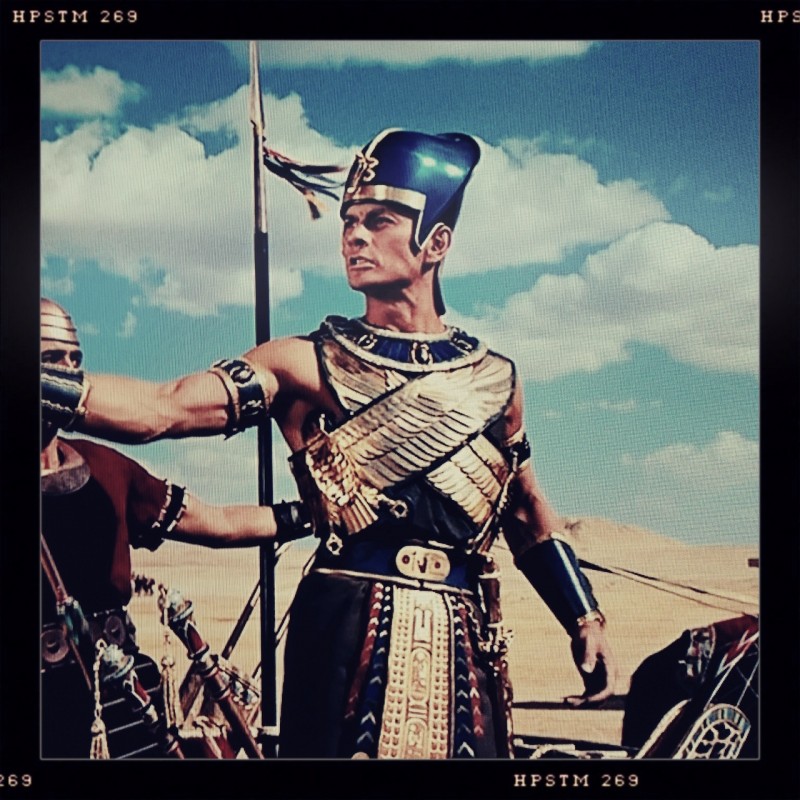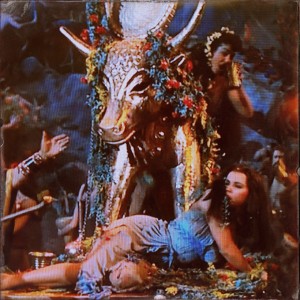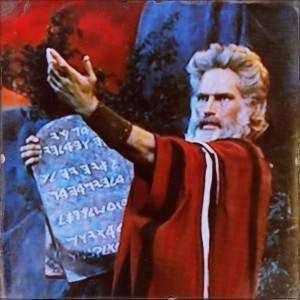
02 May So It Is Written, So Let It Be Done
Springtime means a variety of different things to a variety of people, but one central element in Your Humble Narrator’s personal observation of the season is watching ‘The Ten Commandments’ on television.
I love this movie madly. It’s the absolute worst—a glorious colossal dud of epic (one might even say biblical) proportions. It is so irresistibly awful: cheesy, tawdry and moronic, full of hilariously wooden acting, stilted dialogue, and special effects that are ‘special’ only for their joyfully clanking lameness. It seems rather extraordinary that ‘The Ten Commandments’ was released only eleven years before ‘2001: A Space Odyssey.’ While portions of ‘Commandments’ look as if the sets were constructed with an erector set and some cans of Play Doh, ‘2001’ remains visually stunning 45 years later. But then Cecil B. DeMille and Stanley Kubrick were hardly cut from the same cloth. ‘The Ten Commandments’ strikes me as suggestive of what Ed Wood might have come up with if he had a multimillion dollar budget and a few giant Hollywood back lots to play with. (Of course Kubrick’s name is connected to a notable sword and sandal epic, ‘Spartacus,’ [1960] but that film can only marginally be considered a true Kubrick product.)
In terms of casting, Edward G. Robinson could never be replaced as the dastardly Dathan, but I think Bela Lugosi would have done just as nicely as Vincent Price as the evil slavedriver Baka. Nothing like a bit of the old morphine bends to help conjure up a convincingly distorted evil sneer. And then, of course, we have Moses (Charlton Heston) and Rameses II (Yul Brynner)—certainly two of the most rigid characters in the history of modern cinema. The evil temptress Nefretiri (Anne Baxter) tries her scheming best to inspire the tightly-girded loins of both Rameses and Moses, but with little success: It’s as if she’s trying to seduce a pair of Easter Island monoliths.
One of my maddeningly favorite things about ‘Commandments’ is how utterly mindless and fickle the Hebrew masses are. They remind me (not coincidentally, I’m sure) of the moronic populace of Springfield on ‘The Simpsons’: Highly susceptible to suggestions from their nincompoop civic leaders and the influence of random external factors (i.e., the electricity going off), they regularly erupt into split-second spasms of rioting, looting and vigilantism. In ‘Commandments’ the Hebrews slave away for generations under their pagan Egyptian overlords but a few bellowing exhortations from Moses and they rise up en masse and strike out for the parched unknown. On the other hand, the moment Moses wanders off for the occasional chin-wag with a burning bush or a column of fire the villainous Dathan climbs up on a rock and barks out a bit of opportunistic blasphemy. In a matter of seconds it’s like an Old Testament-style Miley Cyrus concert has broken out. With admirable gusto the Hebrews launch into spontaneous dirty dancing and other non-specific ‘unclean’ activities. Golden calves pop up out of nowhere (oddly, for slaves the Hebrews seem to pack an unusual abundance of precious metals) and the stage is set for some decisive divine smiting once Moses returns from a brisk hike up Mt. Sinai with a rare first edition of the titular guidelines for righteous living in hand, courtesy of his old pal, God.
One thing is certain: Charlton Heston never quite got over his Academy Award-winning turn as Moses. In one form or another, he grimly played the part for the rest of his life, until the undertaker finally pried that Oscar from his cold, dead hands 52 years later. Of the classic he-man school of American actors to emerge from mid-century Hollywood and the waning days of the old studio system, Heston was undoubtedly one of the least talented. Think of Gregory Peck, Burt Lancaster, Kirk Douglas, Robert Mitchum, William Holden, and even back to Clark Gable, Henry Fonda and Jimmy Stewart: All of them were expert at inhabiting roles that communicated varying degrees of humor, pathos, vulnerability, doubt and fallibility. Heston had but one speciality: rigid self-righteous macho rage, Judeo/Christian/American variant. Every once in a while he tried something a bit different (most notably, his bizarrely unconvincing turn as a Mexican policeman in Orson Welles’ wonderfully kinky ‘A Touch of Evil’) but his sweet spot was divine rage.
‘The Ten Commandments’ was one of the last gasps of the old Hollywood cast-of-thousands ‘epic’ genre, perhaps surpassed only by the even more absurdly bloated ‘Cleopatra’ of 1963—a production that almost bankrupted 20th Century Fox. By comparison, ‘Commandments’ remains one of the most financially successful films of all time. In 2008 the American Film Institute designated ‘Commandments’ as number ten on its list of top ten American films of the ‘epic’ genre. I guess I can’t take issue with that: Despite the fact that Sir David Lean pretty much ran the board for the ‘epic’ genre for the latter half of the 20th century, he was a Brit. The annual televising of ‘The Ten Commandments’ on Easter weekend has become an institution since ABC initiated the tradition in 1973 and this certainly accounts, to no small degree, for the film’s enduring popularity. It is, for all of its extravagant silliness, a masterpiece—a masterpiece of kitsch that belongs to an earlier, more innocent time, and for that I will always love this remarkable film.




